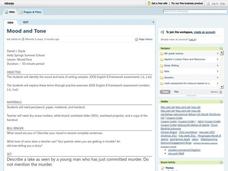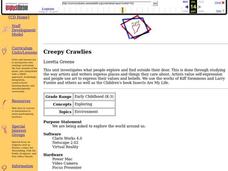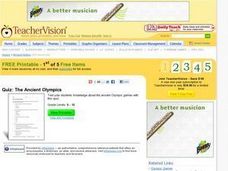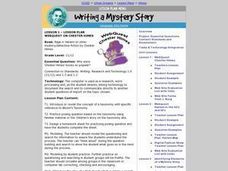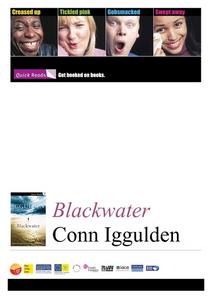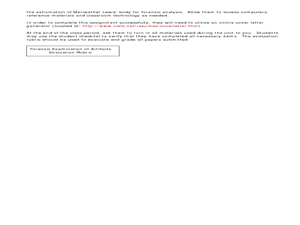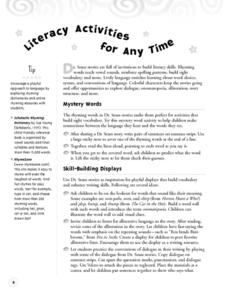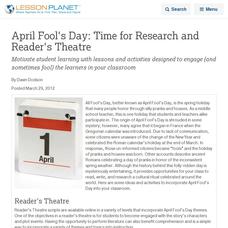Curated OER
Mood and Tone
Students describe their current mood in several complete sentences. They compare their moods with moods set by authors through the tone of their writing. Students read a teacher prepared handout about mood/tone of writing. They write...
Curated OER
Creepy Crawlies
Students participate in several insect-themed activities. They read stories on bugs, write stories about insects with student-made illustrations, sing bug-themed songs, design creepy crawlies with typical insect characteristics and make...
National First Ladies' Library
The Sport of Kings: Horse Racing in America
Pupils examine the history of horse racing. They discuss their experiences with horse racing and conduct Internet research. They select a topic related to the history of horse racing, write and present a report, and read and summarize a...
Curated OER
Greco-Roman Origin Myths
Young scholars explore myths that explain the world, recognize some characters of Greco-Roman mythology and their symbols, and Make personal connections to the theme by writing and drawing a myth of their own.
Curated OER
A Day at the Ancient Olympics
Students examine how athletes from various ancient Greek city-states behaved at the Olympic Games. They conduct Internet research, take notes on a worksheet, and write a screenplay for a television drama about the Olympic Games in...
Curated OER
The Alchemist by Paulo Coehlo
Young scholars complete vocabulary and reading activities for Paulo Coehlo's The Alchemist. In this reading and vocabulary lesson plan, students review vocabulary for the text and read sections of the story. Young scholars answer...
Cliffs Notes
The Count of Monte Cristo: Study Help Essay Topics and Review Questions
In this literature instructional activity, students respond to 5 short answer and essay questions about Alexandre Dumas's The Count of Monte Cristo. Students may also link to an online interactive quiz on the novel at the bottom of the...
Curated OER
WebQuest on Chester Himes
Students perform a WebQuest to find out why Chester Hime's detective books were so popular. Small groups perform the research together then report to the class.
Curated OER
Archaeology 2500: Texano Weapons
Students listen to oral story describing mystery artifact, work in groups to write descriptive report of artifact, and creatively form hypothesis based purely on misinterpretation. Students then explore and discuss difficulty of...
Curated OER
How Does it End?
Students listen to the first part of a story, use drawing software, such as Paint or AppleWorks, to draw, or write and draw, their own imaginary endings to the story. They practice their mouse and computer navigation skills. They share...
Curated OER
Still Life Predictions
Third graders read part of the story "Balto, the Dog Who Saved Nome". They make predictions about the story ending and identify the picture clues and textual information they used to form their predictions. They discuss the story's ending.
Curated OER
Blackwater by Conn Iggulden
Learners read, analyze, critique and discuss the novel, "Blackwater," by Conn Iggulden. They brainstorm and evaluate what's in a name, follow the clues to solving the mystery and explore what happened next to the main character from this...
Curated OER
OOOhhhh, My Toe!!!!
Young scholars examine the /O/ phoneme by examining words and reciting a tongue twister. They practice writing the letter 'O' on their dry erase boards. While they listen to a read aloud of "Bo and Rose" they form the /O/ with their...
Lawrence Virtual School
Context Clues
Considering a lesson on using context clues to figure out the meaning of unfamiliar words? This packet includes a brief reading passage about strategies readers can use and 12 very different graphic organizers, including a template for a...
Curated OER
Lewis and Clark in Columbia River Country
High schoolers interpret historical evidence presented in primary and secondary resources. In this research skills lesson plan, students research the death of Meriwether Lewis using forensic evidence presented in...
Curated OER
Whodunit?
Students bring in a variety of books to be approved for reading outside of class and then complete a book review on each one approved. They remember to include a description of the setting and characters, plot summary and a conclusion in...
Scholastic
Literacy Activities for Any Time
As the title suggests, this packet is loaded with activities that can be used at any time. The common element in all the exercises is that they are connected to books by Dr. Seuss.
Curated OER
Card Catalog Cards
Prepare students on how to use the library's card catalog system as well as the online version. Author, card catalog, the Dewey system, and so much more is addressed. This would be a great tool to use in the classroom or library.
Curated OER
What Can I Do?
Students identify how they are feeling and deal with feelings constructively. In this conflict resolution lesson plan, students explore their feelings through discussion. Students read and complete the What Can I Do? e-sheet. Students...
Great Schools
A Questionnaire: What Do You Like to Read?
What do your fifth graders know about types of fiction, nonfiction, and poetry? Find out as they fill out this questionnaire that requires them to list authors and texts that exemplify each genre. Not only will you be able to assess what...
National Endowment for the Humanities
Faulkner's As I Lay Dying: Concluding the Novel
As I Lay Dying is a beautiful book and a wonderful vehicle for understanding, interpreting, and comparing themes. The class reads and analyzes the novel, discusses possible interpretations, and characterizations. They compare the themes...
Curated OER
Happy April Fool's Day!
Grab students' attention with these lesson and activity ideas on April Fool's Day.
Curriculum Corner
Inferencing
Inferencing is a necessary reading skill to uncover non-explicit messages in text. Use the set of resources as a way to guide learners toward becoming expert inferrers through reading prompts and literature with text and without text.
Shakespeare Globe Trust
Fact Sheet: Shakespeare
When it comes to William Shakespeare, there seem to be more questions than answers! Using the fact sheet, pupils uncover information about the Bard's home and family life, as well as his schooling and career. Readers also learn about his...


